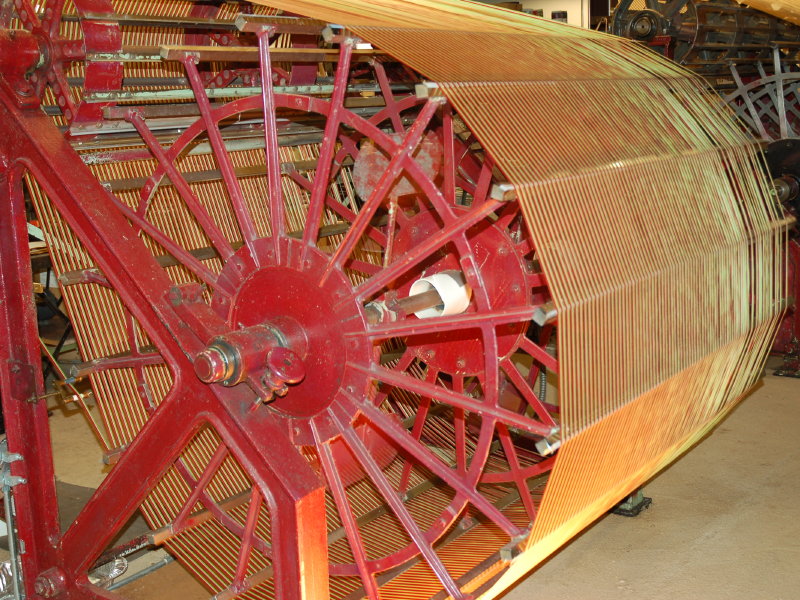In the last five years, "green" has become an all encompassing buzz word, encapsulating eco-friendly production efforts for everything from new cars to kitchen cleaners. And while it may seem that everyone and everything is going green these days, Cream City Ribbon may very well have been one of the first and only to produce organic ribbon.
"It's a biodegradable ribbon which makes it different from most of the ribbons on the market that are petroleum-based compound, except for silk," Lorette Russenberger, owner of Cream City Ribbon, explains. "It is a non-woven product so that means we are bonding cotton fibers together to make the ribbon. So it's very unique."
The acid-free ribbon is made completely of organic cotton and printed with soy-based inks. In a production process that is both logical yet complex, cotton fiber runs through a water soluble adhesive where it is bound and then dried.
"It's our own little way to make a contribution to the environment. It's nice to know you are making something that's not going to snarl up animals and it's not going to be in the ocean for 500 years and be eaten by sea birds," Russenberger says.
With a single technician operating a five-machine system, the 1920s European equipment illustrates both longevity and efficiency. The production facility is climate controlled to maximize dryness but runs almost solely on renewable energy.
Cream City Ribbon personalizes ribbon orders to customer specifications. The ribbon comes in several colors and can have words, designs and small pictures printed on it. Retail stores, flower shops and bakeries use Cream City Ribbon to produce ribbon specifically with their company name and logo.
Cream City Ribbon inherently gives back to the Earth but now it is also giving to the community. Through a collaborative partnership, Cream City Ribbon and the Milwaukee Urban Ecology Center are working to increase the urban exposure to the natural world.
"It's a group I have supported for some time," says Russenberger. "I think they do a wonderful job of introducing urban kids not just to the environment, but understanding something about nature and enjoying being out in nature and learning things that put them in touch with a more real world. It's just a very neat organization, right here in the heart of Milwaukee."
Russenberger created a packaged combination of Cream City ribbon and will donate five percent of sales to the Urban Ecology Center.
"In the past, we've donated a percentage of our profits to organizations but this is the first time we've actually had a product that's tied into a specific organization, she says.
The packaged product consists of 10 small spools of Cream City ribbon; a combination of solids and prints. Russenberger hopes to continue the affiliation through the seasons and create a specific holiday assortment.
While woven ribbon was fairly common in the early part of the century, the advent of plastics replaced cotton usage in most industrial realms. Cream City Ribbon is currently the only company in the nation to produce a non-plastic ribbon.
"The presence of plastics in the environment is causing a lot of mayhem for the environment and wildlife. We're just finding out all of the byproducts that come from it," Russenberger explains.
Cream City Ribbon provides for a few end-user clients but distributors who sell packaging to stores is the majority of their business. They have maintained a few industrial consumers including an oil trucking company using the ribbon to ensure product security.
"Users can take their ribbon after they use it and throw it in a compost heap or use it in the garden or tie up their plants. It has a certain cache because of that."
Russenberger, an art historian by trade, found her home in Milwaukee's small business industry nearly 25 years ago. She purchased Cream City Ribbon 20 years ago when it was still located in the Third Ward. Unable to afford the rising rent and taxes in the Third Ward, Russenberger moved the company to the outer edge of Brewers Hill in 2004.
In addition to Cream City Ribbon, she previously owned Broadway Paper and currently maintains a part-time art restoration business.
"It's creative, artistic and natural," she says. "I was involved in a business that used a lot of chemicals and I wanted to be out of that."
Their location on the edge of Brewers Hill is ideal for a growing business. The refinished cream city brick building contains a small administrative office which doubles as a small retail space and a climate controlled production facility.
As you enter the newly remodeled production room, there is an immediate sense of old and new. The machinery, which is close to a century old, is surrounded by modern technological adaptations interspersed to increase manufacturing efficiency and operator comfort.
"We've had ups and downs but now with the economy changing and the distribution networks changing, we're looking to expand into the consumer market much more and so we see a very large upside in that market and that's why we have this new facility with much greater capacity so we can meet the need when the trend really hits the market."
OnMilwaukee.com staff writer Maureen Post grew up in Wauwatosa. A lover of international and urban culture, Maureen received a bachelor’s degree in sociology from the University of Wisconsin-Madison.
After living on the east side of Madison for several years, Maureen returned to Milwaukee in 2006.
After a brief stint of travel, Maureen joined OnMilwaukee.com as the city’s oldest intern and has been hooked ever since. Combining her three key infatuations, Milwaukee’s great music, incredible food and inspiring art (and yes, in that order), Maureen’s job just about fits her perfectly.
Residing in Bay View, Maureen vehemently believes the city can become fresh and new with a simple move across town.



